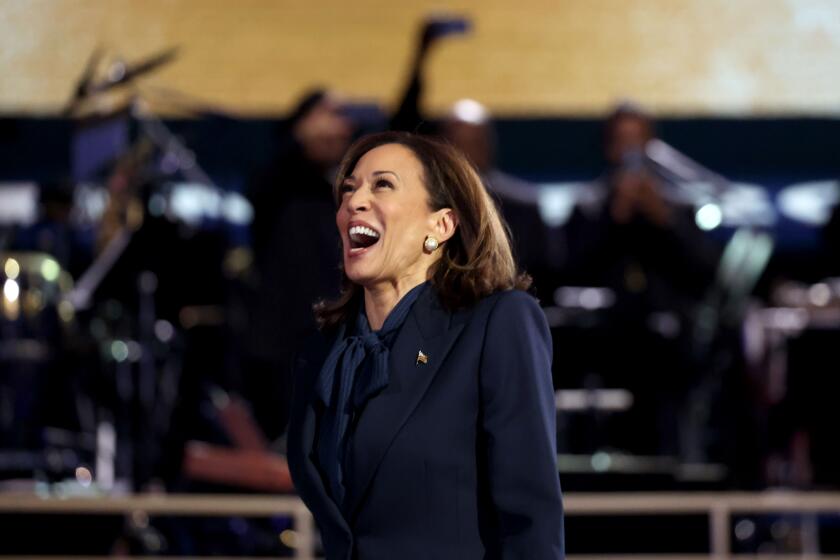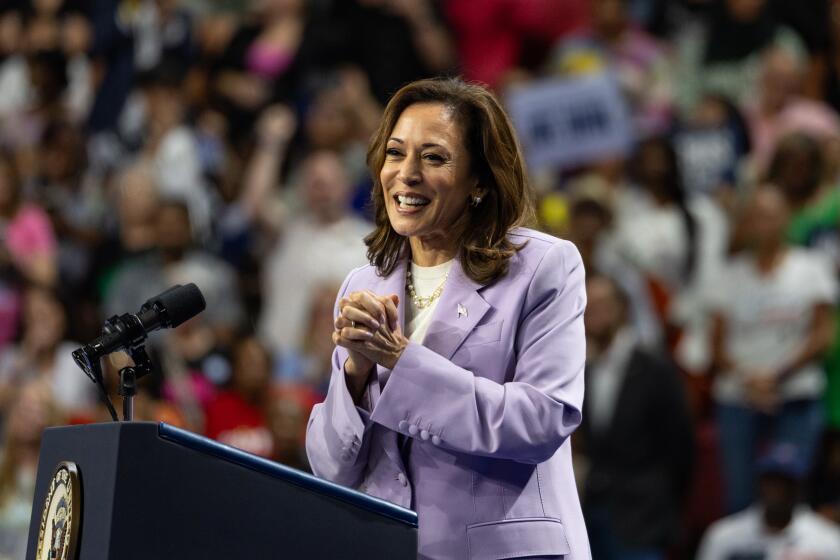Editorial: The honeymoon is over. Harris must start making the case for her presidency

- Share via
In her speech accepting the Democratic presidential nomination Thursday, Vice President Kamala Harris offered a withering indictment of her opponent that could constitute a case for her candidacy. Donald J. Trump, she rightly observed, is in many ways “an unserious man,” but the consequences of returning him to the White House “are extremely serious.”
She asked her audience to “consider the power he will have, especially after the U.S. Supreme Court just ruled that he would be immune from criminal prosecution. Just imagine Donald Trump with no guardrails, and how he would use the immense powers of the presidency of the United States. Not to improve your life, not to strengthen our national security, but to serve the only client he has ever had: himself.”
Kamala Harris faced high expectations for her Democratic convention acceptance speech. She met the moments and strongly positioned herself for the final stretch of the fiercely fought presidential campaign.
She introduced herself to voters who might not know her personal history and spoke of “a new way forward. Not as members of any one party or faction, but as Americans.” Harris did not focus on the fact that her election would mean elevating to the highest office in the land a woman of Black and Indian descent, a milestone for a country with a long history of excluding women and racial minorities from political power.
But now that the Democratic National Convention is over, the hard work for Harris begins. She must do more than repeat that Trump is unfit. She needs to make the complete case to the American people that she would do more to improve their lives and livelihoods. She must demonstrate her vision for the country and convince voters that she is prepared to be a “president for all Americans.”
Kamala Harris was already a historic figure, having been the first female vice president. She does it again this week, accepting the nomination as the first major party candidate who is a Black and South Asian woman.
She showed she is capable of this task with her commanding performance that gave the lie to Trump’s childish denunciation of Harris as “a low IQ individual” and conveyed a seriousness that Americans expect in their president.
Harris was especially forceful in promising that as commander in chief she would ensure that “America always has the strongest, most lethal fighting force in the world.” In a deserved dig at Trump, she added that “I will fulfill our sacred obligation to care for our troops and their families, and I will always honor and never disparage their sacrifice.”
On the war in Gaza, Harris said that “I will always stand up for Israel’s right to defend itself, and I will always ensure Israel has the ability to defend itself,” and she noted that she and President Biden are “working around the clock” to secure a cease-fire and the return of hostages.
But she also said that “what has happened in Gaza over the past 10 months is devastating.” Significantly, she added that she and Biden sought an outcome that would allow the Palestinian people to “realize their right to dignity, security, freedom and self-determination.” Her remarks may have fallen short of what some antiwar activists would have liked, but they signaled a sensitivity to Palestinian lives that is too rare in Washington.
Harris also promised to revive a bipartisan border security bill that Trump sabotaged and to sign a bill to restore reproductive freedom and reverse the effect of the Supreme Court’s overruling of Roe vs. Wade. Trump, of course, has boasted that because of his three appointments to the court “I was able to kill Roe vs. Wade.” Finally, Harris promised that “building that middle class will be a defining goal of my presidency.”
As this compressed campaign continues, Harris will be pressed to provide additional details about her policies. She also must — and we’re confident she will — hold news conferences and sit down for interviews that will allow her to limn out her agenda. A televised debate with Trump on Sept. 10 will also offer her the opportunity to use her prosecutorial persuasion skills to contrast her vision for the country with that of the former president (such as it is).
But the challenge posed by Harris’ acceptance speech was to present herself to a national audience as a competent and committed leader who — unlike her unsavory opponent — can be trusted with the presidency. By that standard the speech was a resounding success.
More to Read
A cure for the common opinion
Get thought-provoking perspectives with our weekly newsletter.
You may occasionally receive promotional content from the Los Angeles Times.












